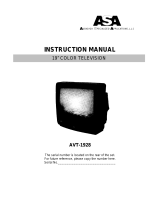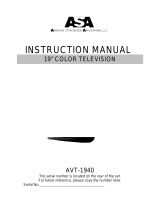
Page 2 of 5
P/N 8005055
Rev. D 12/00
Contents:
AN200 Antenna
AN200 Antenna Pick-up
Coaxial cable
Cleaning Packet
4 Cable Clips
3 Antenna Mast Clips
Allen Wrench
Super Glue
Double Coated Acrylic Foam Tape:
Bond strength is dependent upon the amount of adhesive-to-surface contact developed.
Firm application pressure develops better contact and helps improve bond strength.
Good surface contact can be attained by applying enough pressure to ensure that the tape
experiences approximately 15 psi. Rigid surfaces may require 2 or 3 times that much
surface pressure to make the tape experience 15 psi. To obtain optimum adhesion, the
bonding surfaces must be well unified, clean, and dry. Typical surface cleaning solvents are
isopropyl alcohol/water mixture (50% rubbing alcohol) or heptane.
Note: be sure to follow solvent manufacturer’s precautions and directions for use when using
solvents.
After application, the bond strength will increase as the adhesive flows onto the surface. At
room temperature approximately 50% of their ultimate strength will be achieved after 20
minutes, 90% after 24 hours and 100% after 72 hours. In some cases bond strength can be
achieved more quickly by exposure of the bond to elevated temperatures (i.e. 150° F for 1
hour). This provides better adhesive to wet out onto the substrates.
Ideal tape application temperature is 70° to 100° F. The minimum suggested application to
application of the AN200 adhesive (3M 4943F) is 32°F.
Note: Initial tape application to surfaces at temperature below suggested minimum is not
recommended because the adhesive becomes to firm to adhere readily. However, once
properly applied, low temperature holding is generally satisfactory. It may be necessary to
seal or prime some substrates prior to bonding. Consult 3M BSI Technical Bulletin on
primers for more information. Bonding to glass, ceramic tile, or other similar surfaces in high
humidity environment may require the use of a silage-coupling agent to help ensure a long-
term bond. Consult 3M for a Silage Priming Technical Bulletin.










